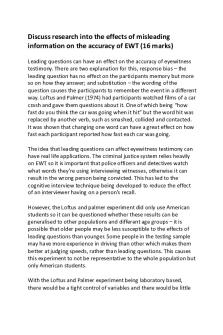Effects of misleading information PDF

| Title | Effects of misleading information |
|---|---|
| Author | EthanB |
| Course | Clinical Psychology |
| Institution | Newcastle University |
| Pages | 2 |
| File Size | 46.6 KB |
| File Type | |
| Total Downloads | 1 |
| Total Views | 162 |
Summary
psychology memory of the effect of misleading information...
Description
Discuss research into the effects of misleading information on the accuracy of EWT (16 marks) Leading questions can have an effect on the accuracy of eyewitness testimony. There are two explanation for this, response bias – the leading question has no effect on the participants memory but more so on how they answer; and substitution – the wording of the question causes the participants to remember the event in a different way. Loftus and Palmer (1974) had participants watched films of a car crash and gave them questions about it. One of which being “how fast do you think the car was going when it hit” but the word hit was replaced by another verb, such as smashed, collided and contacted. It was shown that changing one word can have a great effect on how fast each participant reported how fast each car was going. The idea that leading questions can affect eyewitness testimony can have real life applications. The criminal justice system relies heavily on EWT so it is important that police officers and detectives watch what words they’re using interviewing witnesses, otherwise it can result in the wrong person being convicted. This has led to the cognitive interview technique being developed to reduce the effect of an interviewer having on a person’s recall. However, the Loftus and palmer experiment did only use American students so it can be questioned whether these results can be generalised to other populations and different age groups – it is possible that older people may be less susceptible to the effects of leading questions than younger. Some people in the testing sample may have more experience in driving than other which makes them better at judging speeds, rather than leading questions. This causes this experiment to not be representative to the whole population but only American students. With the Loftus and Palmer experiment being laboratory based, there would be a tight control of variables and there would be little
effect on extraneous variable which could affect results, so researchers are able to ascertain that changing the verb has a direct result on the speed given. This means that it would be easy to replicate across different demographics and populations to see if you would get concordant results. This allows psychologists see to how representative the study is across different samples. Post event discussion is a conversation between co witnesses or an interviewer and an eyewitness after a crime has taken place. The problem with this is that it may contaminate or alter the witness’s memory of the event. Gabbert (2003) conducted a laboratory experiment where participants watched a video of a girl stealing money from a wallet. They were given a recall test after the video where in one condition, they were tested individually and in the other, in pairs. In the co-witness group, only one of the participants actually witnessed the girl stealing but after a discussion it was found that 71% of participants reported information that they had not seen. This could be as a result of memory conformity, where people would comply or internalise views shared to avoid social rejection....
Similar Free PDFs

THE EFFECTS OF CORRUPTION
- 5 Pages

Environmental Effects OF Quarrying
- 18 Pages

2... Effects OF Privation
- 2 Pages

Physiological Effects of Massage
- 8 Pages

Legal effects of marriage
- 34 Pages

18 Misleading or deceptive conduct
- 96 Pages

P4. Turning effects of forces
- 1 Pages

Effects of the Sugar REvolution
- 4 Pages

Effects of internet on society
- 3 Pages

Effects Of Sitcoms On Teenagers
- 6 Pages
Popular Institutions
- Tinajero National High School - Annex
- Politeknik Caltex Riau
- Yokohama City University
- SGT University
- University of Al-Qadisiyah
- Divine Word College of Vigan
- Techniek College Rotterdam
- Universidade de Santiago
- Universiti Teknologi MARA Cawangan Johor Kampus Pasir Gudang
- Poltekkes Kemenkes Yogyakarta
- Baguio City National High School
- Colegio san marcos
- preparatoria uno
- Centro de Bachillerato Tecnológico Industrial y de Servicios No. 107
- Dalian Maritime University
- Quang Trung Secondary School
- Colegio Tecnológico en Informática
- Corporación Regional de Educación Superior
- Grupo CEDVA
- Dar Al Uloom University
- Centro de Estudios Preuniversitarios de la Universidad Nacional de Ingeniería
- 上智大学
- Aakash International School, Nuna Majara
- San Felipe Neri Catholic School
- Kang Chiao International School - New Taipei City
- Misamis Occidental National High School
- Institución Educativa Escuela Normal Juan Ladrilleros
- Kolehiyo ng Pantukan
- Batanes State College
- Instituto Continental
- Sekolah Menengah Kejuruan Kesehatan Kaltara (Tarakan)
- Colegio de La Inmaculada Concepcion - Cebu





